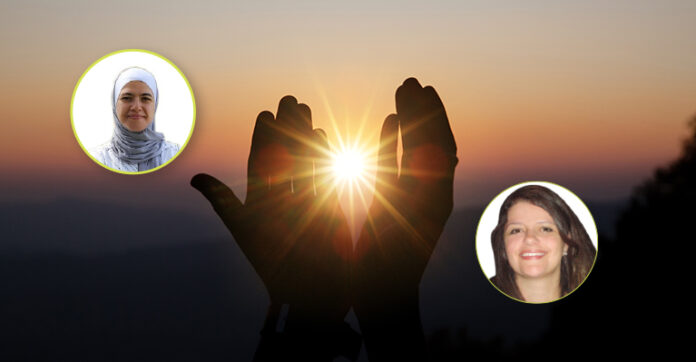
Muslim and Christian reflections on our spiritual health
Who would ever have dreamed that in December we’d be witnessing the genocide of a people living on the same land Christ was born and walked on? As 2023 comes to a close, Divine Perspectives writers Nauras Abu Haija and Sonia Salfity share their thoughts on the logic behind giving thanks after loss in this last month of a year filled with grief and pain.
By Nauras Abulhaija, A Muslim Perspective
It is easy to be grateful when things are going well; we smile and say “thanks be to God”. I am thankful for my family for my job, health, wealth and friends; we are always encouraged to “count our blessings.” But for Muslims, gratitude is a state of being. It is part of faith and a test of our complete submission to God and His will.
In the past weeks, many were shocked by images emerging from Gaza; where people’s first reaction to losing a loved one or a home is to say Alhamdulilah. What is the logic behind giving thanks after such a loss? This ignited many people to research the term and the faith that drives this attitude.
The word Alhamdulilah increased in search volume on search engines in an unprecedented manner. The world became curious about this attitude of thankfulness, gratefulness and Praise to God through such an atrocity.
Complete Submission
The spontaneous response of Muslims when asked how they are is always: Alhamdulilah (Praise be to God). You can ask your neighbour in the morning how she is, and she will say Alhamdulilah, or you can ask a friend undergoing chemotherapy who is in agonising pain how he feels and he would still respond with Alhamdulilah.
No, this is not toxic negativity like what is paraded these days by many so-called motivational speakers; it is submission and the complete belief in God’s wisdom – accepting fate and having faith that whatever is will be.
Muslims pray five times a day; each prayer commences with the same verse from the Quran: “Praise be to God, the cherisher and sustainer of the worlds,” Qur’an (1:2). So, it’s only natural that Alhamdulilah, is repeated by a Muslim who repeats this verse several times daily.
Praising God is a practice Muslims do repeatedly throughout their day; giving thanks and gratitude to God, as well as being thankful to others, is an encouraged practice. “If you are grateful, I will add more (favours) unto you,” Qur’an (14:7). We know if we are grateful, we will be rewarded. These verses are among 27 on thankfulness and gratitude throughout the Qur’an.
In the prophetic tradition, there are several situations where the Prophet reminds us to praise God and be thankful. The Prophet says: “The one who does not thank people is not thankful to God,” (Abu Dawood 4885). He also says “Any matter of importance which is not begun with Alhamdulillah remains defective,”( Riyad Salihin Book 13, Hadith 2).
Gratitude through pain
The core of the Muslim creed is to submit to God, the Creator by submitting, we accept. Acceptance is what grieving people are trained to do after a loss or after going through a traumatic experience. Accepting fate and God’s will makes a Muslim grateful even in difficult times.
Gratitude also comes from knowing that this acceptance is rewarded; this thankfulness and appreciation are cited in this life and on the day of judgment. Someone with solid faith will know deep down that this infliction, even if it hurts, is from God; why? Sometimes, we learn immediately, discover later, or for reasons we will not know in this lifetime. But we know for sure that patience and gratitude are rewarded, pain is rewarded, and believing in God’s will is rewarded.
You can contact Nauras at [email protected]
By Sonia Salfity, A Christian Perspective
As Christians celebrate the birth of Christ, we cannot help but think of the recent unrest in the land he walked on. We grieve with those who grieve and weep with those who weep. That’s what Jesus did and it’s exactly what he calls all his followers to do.
Peace to all people
Despite being born in Bethlehem over 2,000 years ago into a time of major upset, the Saviour of the world entered it with humility and grace. It doesn’t get humbler than choosing to come as a helpless babe born in a manger that was meant for animals. And to parents who were as poor as they come.
He came to bring peace to all people from every tribe and every nation. That is why the Gospel is called The Good News. It’s about eternal salvation and peace beyond understanding. “For to us a child is born, to us a son is given and the government will be on his shoulders. And he will be called Wonderful Counsellor Mighty God, Everlasting Father, Prince of Peace.”( Isaiah 9:6).
As we painfully watch the unrest in the Holy Land and all over the world, we understand that conflict knows no limits. Hatred has no boundaries. No one is immune to the effects of a broken world. Jesus knew that full well and warned us not be dismayed when trouble arises.
A threat of fear
Christ himself experienced the pain and suffering of what it’s like to have to flee as He became a refugee child in Egypt. God’s infinite grace showed up in a dream when an angel of the Lord warned Joseph that King Herod wished to kill Jesus.
Herod feared that this new so-called king might threaten his position of power (read Matthew 2:13-23). Fear causes people to commit unspeakable atrocities against other human beings who are made in God’s image.
To add insult to injury, the world feeds our fear in so many ways that if we are not cautious, we all fall victim to its ugly threats. The result is feeling angry, bitter and insecure. It’s impossible to thrive when we’re just trying to survive in a world that is anything but life-giving.
Patterns of dysfunction and destruction
We see the patterns of dysfunction and destruction all around us. We can lose hope when fear prevents us from trusting that God sees us and knows the injustices we are enduring.
Despite the world around us spinning out of control, we can always count on our unchanging and most sovereign God who remains unshakable. He is the only one who can redeem even the most difficult of situations and bring good and beauty out of the ashes – only God can do this.
The way, the truth and the life
When Jesus told his disciples that He was the way, the Truth and the Life, He was inviting them to a better way to live. He was showing them that He came to bring His Heavenly Kingdom to a complete transformation and rebirth after His resurrection.
Jesus still offers us this same gift today. He offers His peace that is beyond understanding to all who trust Him. As we surrender our will to His, we can live as children of the Light and not of the darkness.
He equips us with His healing strength when we are weak. His redeeming love replaces all hatred, fear, bitterness, malice, stubbornness and pride. He empowers us to live a life that is pleasing to our Heavenly Father, helping us to obey His commandment to love Him and put the interest of others ahead of our own. This is the opposite of what the world tells us we must do.
But we were created for a much bigger purpose. We were made to worship and glorify our Creator, Saviour, Healer, Sanctifier and Coming King. May His peace, which surpasses all understanding, be yours this Christmas season especially during these hardest of times.
May He restore to us the joy of our salvation and renew our hope in Him and Him alone. I leave you with a prayer by Douglas Kaine McKelvey taken from his book Every Moment Holy Volume II Death, Grief, and Hope: “Indeed, O Lord, let us love now more fearlessly, remembering that You created us, and appointed us to live in these very places, in the midst of these unsettled times. And in these holy vocations, You have not left us helpless, O Lord, because You have not left us at all. Your Spirit remains among us. Inhabit now your church. O Spirit of the Risen Christ. Unite and equip your people for the work before them.”
Amen and amen!
Recommended reading: Yet in the Dark Streets Shining: A Palestinian Story of Hope and Resilience in Bethlehem by Bishara Awad
You can contact Sonia Salfity at [email protected]





